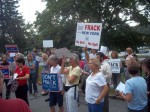Anti-Fracking Forces Rally at Mount Kisco Vigil

Opponents of hydraulic fracturing once again turned up the heat on Gov. Andrew Cuomo last week in hopes of convincing him to ban the controversial practice of extracting natural gas in five upstate counties.
A Sept. 5 vigil held outside St. Mark’s Episcopal Church in Mount Kisco was the second event held in the village in the past six weeks, just several miles from Cuomo’s home. Speakers included local clergy and representatives of environmental groups from around the state who warned of serious consequences should hydrofacking be permitted, including the potential for tainted water supplies similar to what has happened in areas in Pennsylvania.
Meanwhile, the natural gas industry has been touting how hydrofracking would create jobs for portions of upstate’s moribund economy and would help the nation achieve greater energy independence.
“It’s kind of disconcerting being in the home of someone who is trying to destroy yours, but it’s not too late for (Cuomo) to turn away from a policy in which nothing is safe, no one is safe and nothing is sacred,” said Pramilla Malick, a resident of Minisink, Orange County.
“Let Gov. Cuomo know we will not allow anyone to be sacrificed, not in Minisink, not in the southern tier, not anywhere,” Malick added.
While the Cuomo administration hasn’t formally reached a conclusion regarding fracking in the upstate Marcellus Shale, the governor has reportedly decided to let officials in five counties along the Pennsylvania border where fracking would take place–Broome, Chenango, Chemung, Steuben and Tioga–to determine whether they would like to allow it in their home communities. According to one report, more than 40 municipalities have passed resolutions in favor of hydraulic fracturing while close to 140 others have imposed a moratorium or a ban.
Calls placed by The Examiner to the governor’s press office last week to learn more about Cuomo’s position on the issue were not returned.
The more than 100 anti-fracking demonstrators who attended last week’s vigil said extracting natural gas using high-pressure water to fracture the rock and then drill horizontally would be a disaster for the environment. Erin Heaton, an Armonk resident who has a summer home in New Berlin, Chenango County, said the region, a large dairy producing area that provides food to New York City and Westchester, would be endangered. Tourism would also be lost, she said.
Heaton’s summer community is also home to Chobani Yogurt, currently the largest yogurt company in the United States.
“A lot of hunting, fishing, recreation, all would be lost, all for a short-term industry that would leave the area devastated,” she said.
Jill Wiener of Catskills Citizens for Safe Energy in Sullivan County said the promises of economic revitalization and helping to limit oil imports are exaggerated. Most of the jobs are temporary and many of the employees are transient workers from out of state.
“The red, white and blue hard sell of energy independence and job creation is nothing more than snake oil,” Wiener said.
Assemblyman Robert Castelli, who has supported a fracking moratorium unless it can be scientifically proven that the practice is safe, saw a bi-partisan bill that he co-sponsored pass the Assembly late last session calling from an impact assessment.
He said he also wants to have separate studies conducted by the state Department of Environmental Conservation and the federal Environmental Protection Agency analyzed before any conclusion is reached.
“The gas has been in the ground for the past 288 million years, it can stay in the ground a little bit longer,” Castelli said.
However, an official from the Independent Oil and Gas Association of New York, which has been pushing hard to have the state opened up for natural gas extraction, said New York is missing out on the economic revitalization that other states have been experiencing. The country is also at a 20-year low for oil imports mainly due to hydraulic fracturing in Texas and North Dakota, a recent Bloomberg News report stated.
“New Yorkers and elected leaders i both major parties must recognize that natural gas production is already leading to an economic rebirth in other states, lower energy costs across the country and an undeniable resurgence in job-creation and American manufacturing, ” said IOGA Vice President Brad Gill.
But Tim Woodcock, a New York City resident who attended last week’s vigil, said the history of well water contamination in Pennsylvania leading to serious health problems and devastation of the countryside that was highlighted in the documentary “Gasland,” could also become New York’s fate.
“If you can convince my friends in Bradford County, Pa. that fracking can be done safely, then I’ll start listening,” Woodcock said.

Martin has more than 30 years experience covering local news in Westchester and Putnam counties, including a frequent focus on zoning and planning issues. He has been editor-in-chief of The Examiner since its inception in 2007. Read more from Martin’s editor-author bio here. Read Martin’s archived work here: https://www.theexaminernews.com/author/martin-wilbur2007/
